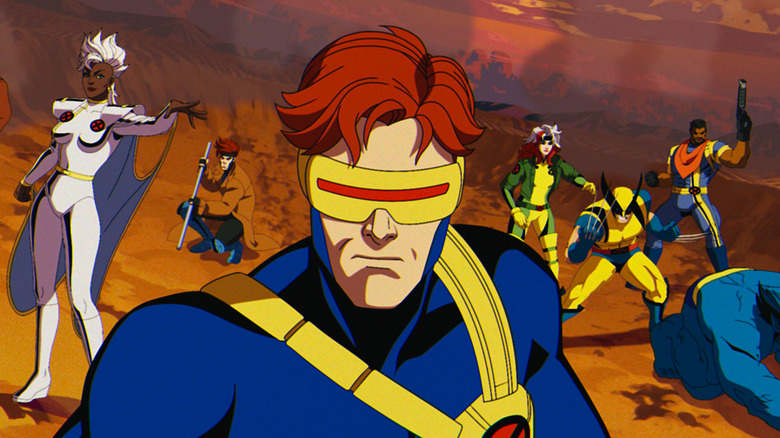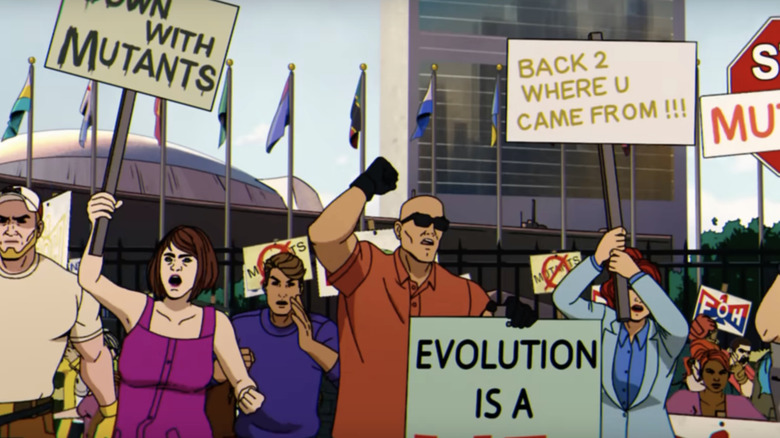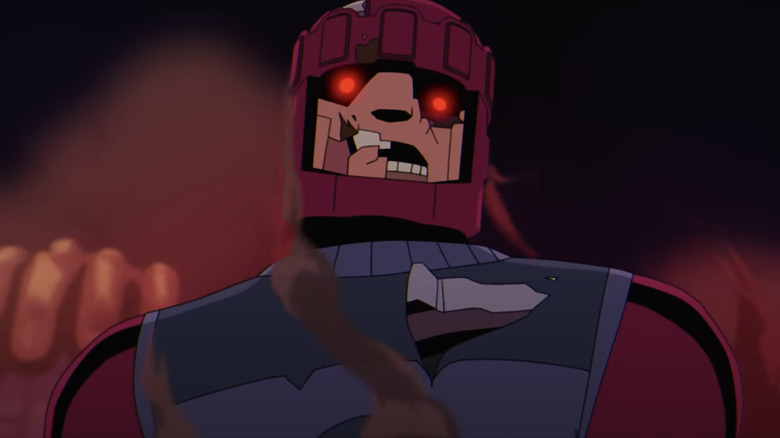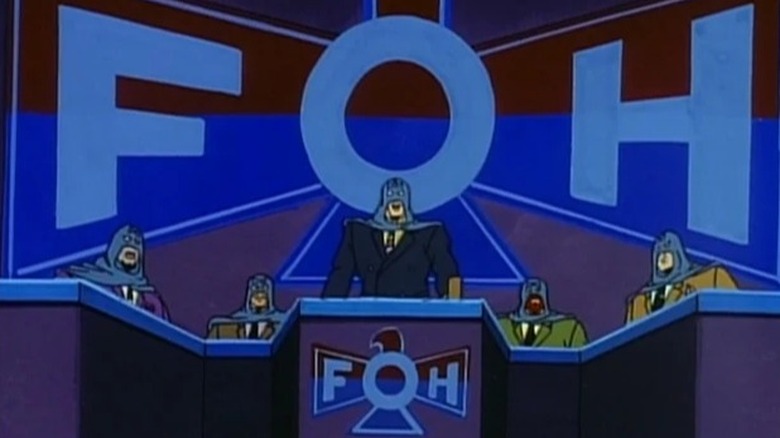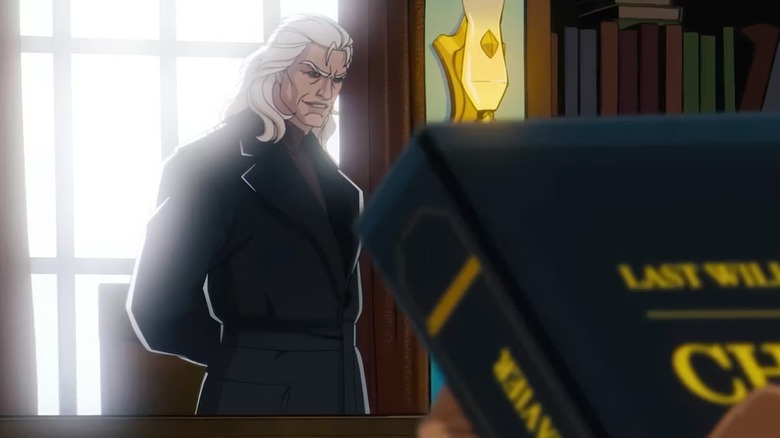The Essential Aspect Of The Comics That X-Men '97 Had To Get Right [Exclusive]
Spoilers for "X-Men '97" to follow.
The X-Men are back on TV and "X-Men '97" wants you to feel like they never left. The animation is different, but many of the original "X-Men" voice actors are back and the story picks up mere months after the O.G. series finale "Graduation Day." (Need an "X-Men" refresher before "'97"? We've got you covered.) The creators of "X-Men '97" are fans passionate about getting it right and it shows.
/Film's Ethan Anderton spoke with "X-Men '97" supervising producer/head director Jake Castorena for an episode of the /Film Daily podcast. Castorena stressed that making the show feel compatible with the old series was a priority:
"[We had to understand] that it's a revival. It's not a reboot. It's a spiritual successor, it's on the shoulders of what came before, and it's got to feel like it's a continuation. The goal is, you've gotta go from 'Graduation Day,' season 5, right into our show. The O.G. show into our show. And vice versa. For new fans, that will bring you into the X-Men with our show as a gateway for the O.G. show. So all of that, to paraphrase, a lot of that was in the mission statement, in the core bible from day one."
That series bible also contained what Castorena and his colleagues defined as the ethos of the X-Men for the stories they'll be telling:
"First and foremost, the X-Men always will be, always should be, and always have been an allegory for prejudice. The minute you take that away from the X-Men, they're no longer the X-Men."
Indeed, what sets the X-Men apart from the Avengers is that they're mutants; people born with powers who compromise a minority group, which in turn allegorizes real minorities.
In X-Men, prejudice is the real supervillain
The X-Men were created by Stan Lee and Jack Kirby in 1963, the year before the Civil Rights Act was signed into law and a lasting blow was struck against the racism built into America. As more and more voices have made themselves heard in our society, the X-Men's mutant allegory has largely shifted to one of queerness (helped by queer fans who read such themes into the comics).
The 1982 graphic novel "X-Men: God Loves, Man Kills" (by Chris Claremont and Brent Eric Anderson) was a critique of Reagan-era televangelism so pointed that the "X-Men" movies had to tone it down. Castorena continued:
"[The O.G. show] pulled from the books and it pulled from those stories, and it didn't shy away from those stories. It didn't dumb them down for a younger audience, either. It told stories. Within the Saturday morning pocket, right, but it told stories. It stuck with relatable themes: prejudice, found family, who is my tribe, self-acceptance. A lot of these themes are core fundamentals to the X-Men."
Indeed, even the opening titles of the original series don't hide these ideas; Jubilee is chased by an angry mob but finds herself trapped behind a chain link fence. That's why internet reactionaries lambasting "X-Men '97" as "woke" are so ridiculous; the progressive themes were always there. It's not impossible to like a piece of art and disagree with its politics, of course, but denying such themes are there when they're as blatant as they are in "X-Men" is absurd.
So, does "X-Men '97" live up to Castorena's promises?
X-Men vs the Sentinels
Some context from the original "X-Men." The villains of season 1 were the Sentinels, mutant-hunting robots built by fearful racists. The series kicked off with the two-parter "Night of the Sentinels" and the season 1 finale, "The Final Decision," featured the X-Men destroying Master Mold, the central Sentinel AI. By season 2, the Sentinel program had been shut down. So, in their place, the hate group The Friends of Humanity sprung up; if the government wouldn't persecute mutants, vigilantes would.
"X-Men '97" opens with the X-Men fighting the Friends of Humanity, who have gotten their hands on salvaged Sentinel tech. Episode 1 concludes with the X-Men tracking a new Sentinel factory to the Sahara and once again destroying the robots. It's telling that the Sentinels have now served as introductory villains twice over. There's a pragmatic reason; they're a legion of robots with programming instead of personality. So, the focus can be solely on establishing the X-Men themselves. "X-Men" producer Will Meugniot feels the first pilot, "Pryde of the X-Men," failed because it used the Brotherhood of Mutants as villains instead of the Sentinels, making the story too stuffed.
Thematically, though, the Sentinels are representative of humanity's ingenuity and hatred; they'd sooner build metal beings to wage war than welcome fellow people of flesh if that flesh is of a different color than their own. The original Sentinel trilogy ("X-Men" issues #14-16) is one of the few times in the Lee/Kirby years that it feels like mutants are "feared and hated." Most of the time, Stan the Man had the X-Men fighting other mutants; they had to police their kind to prove themselves "the good ones."
Sunspot, a mutant abducted by the Friends of Humanity, tries that "good mutant" line on them and fails; "X-Men '97" is aware bigots can't be appeased.
Tolerance is extinction
Henry Gyrich (an anti-mutant government creep and one of the original backers of the Sentinels) tells the X-Men in "'97" episode 1 that "Tolerance is Extinction." If mutants aren't eradicated, Gyrich says, they'll eradicate humanity.
After all, mutants are the next step in evolution; they are Homo Superior, and they don't need to enslave us normie Homo Sapiens to become the dominant species; they just have to keep making little mutants, and one day they'll inherit the Earth because everyone alive will have the X-Gene separating mutants from humans. Gyrich's argument feels like a veiled take on "Great Replacement Theory," the Nazi conspiracy that white people are being "replaced" by "the elites." Like real racists, Gyrich fails to recognize that he shares common humanity with people he hates.
In "X-Men" #200, "The Trial of Magneto" (by Chris Claremont and John Romita Jr.), Magneto declares before a (human) tribunal: "You cannot wish us away. You cannot ignore us. We — Homo Sapiens Superior — are your children. We are the next generation of humanity. What kind of parent fears his progeny? Tries to murder them? Is this the legacy you wish to leave? I have seen the error of my ways — Can you say the same?!"
Building a future for the X-Men
Episode 2, "Mutant Liberation Begins," loosely adapts "The Trial of Magneto." Magneto's speech in his defense isn't pulled verbatim from the comic books, but it hits the same notes. The speech also alludes to Magneto's origin as a Holocaust survivor more explicitly than the original series ever did (there, he was depicted more as a non-specific European refugee, in one instance where the show did tone down the source material). Magneto recalls how his Jewish kinsmen were killed only because they "called God by a different name" and says his actions are driven by the ethos of "Never Again."
Magneto then takes a United Nations council into low orbit around Earth; not to kill them like he once might have, but to let them look down on the world: "An old friend has challenged me to remember this view of Earth. How vast it is, versus how small we make it." Magneto's speech is cross-cut with Jean Grey giving birth to her son. Earlier in the episode, Jean admitted that she worries about how her to-be-born son will grow up in a world afflicted by prejudice, where some people will hate him if he's a mutant. Bridging these two moments represents how the future that boy will live in is on the line, depending on the actions we all take on this shared home of ours every day. If someone like Magneto — who has every reason to hate — is willing to give tolerance a chance, why can't we all?
The first two episodes of "X-Men '97" are now streaming on Disney+.
